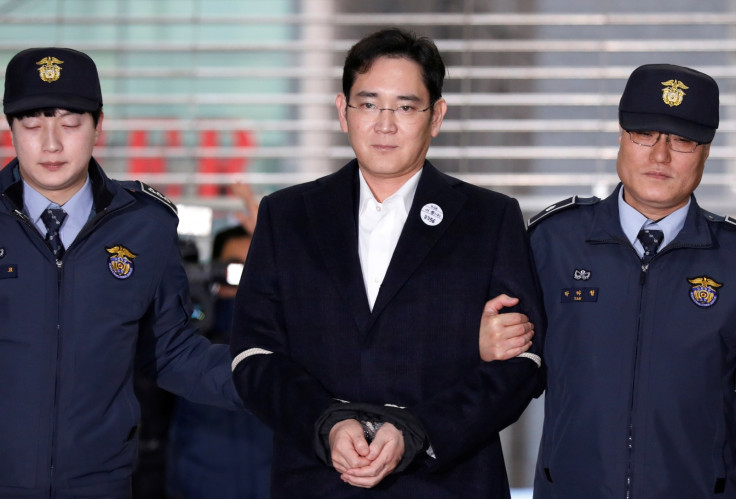Samsung's heir follows family tradition by facing corruption charge in 'trial of the century'
Vice chairman and de facto chief Jay Y Lee is accused of bribery and embezzlement.

The "trial of the century" started on 9 March. You may not have heard about it because it is taking place in South Korea. And the funny thing is, you may never hear about it again once it's over, even if the man standing trial is found guilty.
The trial involves Jay Y. Lee, the vice chairman and heir apparent of the Samsung empire. He is accused of bribery and embezzlement in a trial which is inextricably linked to disgraced President Park Geun-hye, who on 10 March became the first democratically elected leader of the country to be removed from office. The president and her adviser, Choi Soon-sil, are accused of taking up to $38m (£31m) in bribes from Samsung to facilitate the smooth transition of power from father to son – and could now face criminal charges after the president lost her presidential immunity.
Lee is currently incarcerated in the Seoul Detention Center. Among his fellow inmates is Yoo Young-chul, a self-confessed cannibal sitting on death row for killing 20 people. While this would be embarrassing for most executives, the fact Lee is the heir to the most important industrial empire in South Korea, and as such viewed as something approaching a deity, incarceration brings with it a deep shame on him and his family.
But that shame is likely only to last for a short time because, if history has taught us anything, it's that Samsung leaders don't have to wait long for the kind arm of government to come and save them from their shame.
Murky past
Samsung was founded in 1938 as a trucking company by Lee's grandfather, Lee Byung-chull, who grew the business quickly thanks to close – and corrupt – ties with the authoritarian administration of Syngman Rhee. When Rhee was overthrown and his replacement accused the Samsung founder of corruption, Lee Byung-chull was quickly able to convince him to drop the charges.
Lee Kun-hee took control of the company in 1987 and like his father was soon charged with corruption. This time he was convicted and even received a two-year jail term. That was soon overturned and a presidential pardon was granted a year later.
He didn't learn however and in 2008, Lee Kun-hee resigned from Samsung after being found guilty of embezzlement and tax evasion, a decision which carried with it a three-year jail sentence. The sentence was suspended, a fine of around $90 million was paid, Lee Kun-hee was pardoned and he returned to Samsung as chairman in 2010.
Now Jay L. Lee stands accused of bribery and embezzlement in a trial which is dominating newspaper and TV coverage in the country, focusing attention not only on the company – which is the largest of Korea's chaebols – but also Lee, a man viewed by many as someone who could break Samsung's traditional ways of doing business.
Modern man
Lee is vice-chairman of the Samsung conglomerate – which incorporates up to 60 affiliates which engage in everything from ship-building to making chemicals and of course the Samsung Electronics business which is the crown jewel of the group.
Lee's father, Lee Kun-hee, remains as chairman despite the fact he has been in a coma since suffering a heart attack in 2014.
Lee is however chairman in all but name, running the firm and travelling the world striking deals with some of the biggest companies in the world. A highly intelligent businessman, Lee is equally at home in the boardrooms of Silicon Valley as the buttoned-down world of South Korean business.
He was the only Korean executive invited to the funeral of Apple founder Steve Jobs in 2011. The fact this happened during the ongoing and bitter patent dispute between Apple and Samsung is an indication of what high esteem Lee is held by peers around the world.
For Samsung and its 300,000 employees it's going to be business as usual in the day-to-day running of the company. The structure of the company is such that it will operate efficiently even with its top executive – and several of his lieutenants – standing trial for corruption.
Where Samsung will feel the pinch however is by missing Lee's ability to sign the big deals the company needs to grow. This will be most evidently felt in Samsung's component business which supplies products like screens, batteries and chips to makers of smartphones, tablets and laptops around the globe.
Indeed one of Lee's last acts before he was incarcerated is believed to be sealing a deal with Apple to supply OLED displays for the company's new iPhone, expected later this year.
But, as we have seen, the chances of Lee feeling the full force of the law are slim given his position in Korean society and the esteem with which Samsung is held. Even with the president set to be indicted, the close ties between government and business in Korea mean that Samsung's heir apparent will likely soon be back in control.
Once the trial is finished and things settle back down again, the likelihood is you won't ever hear about this scandal again, at least not in Korea, where media, TV and book publishers routinely whitewash the biographies of the leaders of these chaebols to eliminate any mention of wrongdoing.
© Copyright IBTimes 2025. All rights reserved.






















